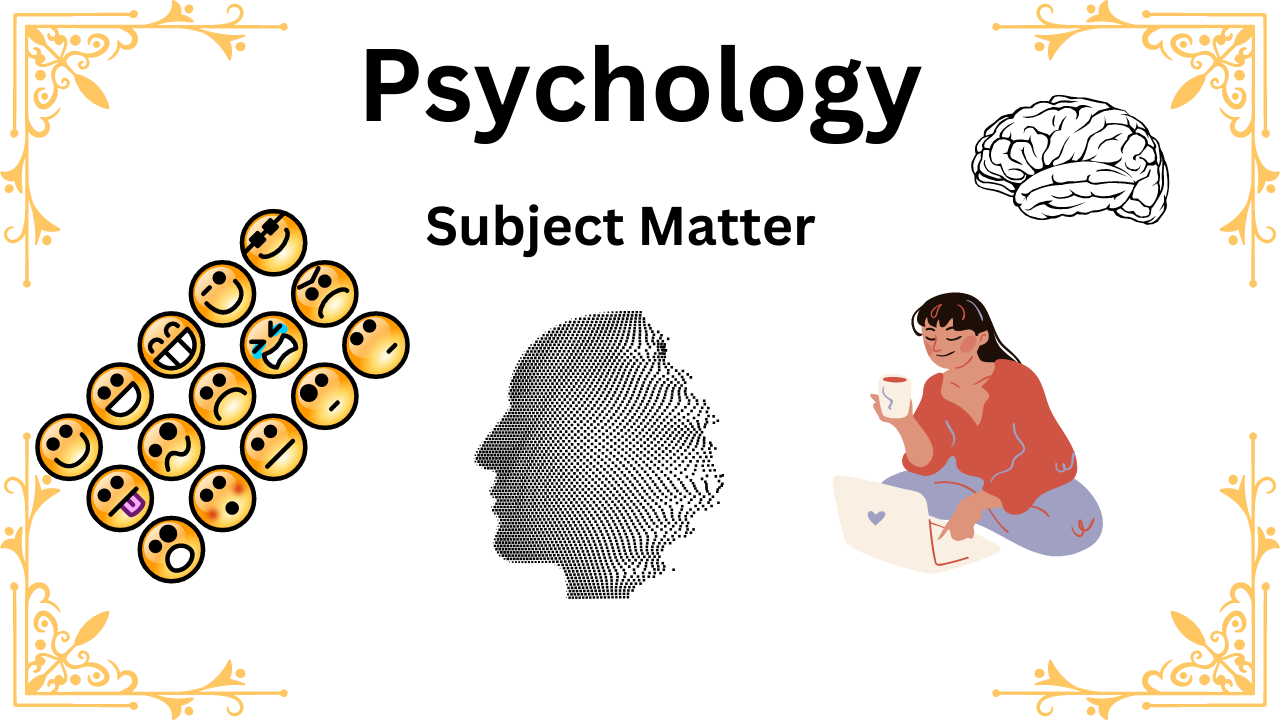Psychology, the captivating science of the human mind and behaviour, delves into the complexities of our thoughts, emotions, motivations, and actions. It encompasses a vast array of topics and areas of inquiry, aiming to unravel the mysteries that lie within our consciousness. From understanding the intricacies of cognitive processes to exploring the depths of social interactions and mental health, This offers a profound exploration of what makes us who we are.
Importance of matter of psychology
At its core, psychology is a scientific discipline that seeks to unravel the mysteries of human behavior. Through rigorous research methods and systematic observation, psychologists attempt to uncover the underlying principles and mechanisms that govern our thoughts, feelings, and actions.
By studying both individuals and groups, psychology sheds light on the complex interactions between our internal mental processes and the external environment.
The subject of psychology spans a vast terrain. It includes various sub-disciplines and specialized study areas, each focusing on specific aspects of human psychology. Clinical psychology examines the understanding and treatment of mental disorders, while cognitive psychology explores the nuances of perception, memory, and problem-solving.
Developmental psychology examines the journey from childhood to adulthood, revealing the milestones and challenges we encounter along the way. Social psychology examines the complexities of human interaction and the influence of social factors on our behavior. These are just a few examples of the countless fascinating fields that make up the subject of psychology.
The vast terrain
The subject of psychology spans a vast terrain. It includes various sub-disciplines and specialized study areas, each focusing on specific aspects of human psychology. Clinical psychology examines the understanding and treatment of mental disorders, while cognitive psychology explores the nuances of perception, memory, and problem solving.
Developmental psychology examines the journey from childhood to adulthood, revealing the milestones and challenges we encounter along the way. Social psychology examines the complexities of human interaction and the influence of social factors on our behavior. These are just a few examples of the countless fascinating fields that make up the subject of psychology.
Research Methods Of Psychologists
Psychologists use a variety of research methods, including experiments, surveys, observations, and interviews, to gather empirical data and gain meaningful insights. By meticulously analyzing and interpreting this data, they develop theories, models, and frameworks that deepen our understanding of human behavior and mental processes.
This knowledge finds practical applications in a variety of domains, from clinical interventions to educational strategies, organizational management, and beyond.

The subject matter of psychology is the scientific study of the human mind and behavior. It encompasses a wide range of topics and areas of inquiry, aiming to understand and explain various aspects of human cognition, emotions, motivations, personality, development, social interactions, mental health, and more. Psychology explores both individual and group behaviour, seeking to identify patterns, principles, and underlying mechanisms that influence human thoughts, feelings, and actions.
Psychologists employ various research methods, including experiments, surveys, observations, and interviews, to gather data and generate knowledge about human behavior and mental processes.
They analyze and interpret this information to develop theories, models, and frameworks that help explain and predict human behaviour and psychological phenomena.
Psychology is a broad field that includes several sub-disciplines and specialized areas of study, such as clinical psychology, cognitive psychology, developmental psychology, social psychology, personality psychology, educational psychology, industrial-organizational psychology, and many others.
Each of these branches focuses on specific aspects of human psychology, exploring different questions and employing specific methodologies tailored to their respective domains.
Note: Overall, psychology seeks to provide insights into the complexities of human behaviour, cognition, and emotions, with the ultimate goal of improving individual well-being, enhancing mental health, and contributing to our understanding of human nature.
Lern some extra about social interaction and mental health
Social interaction refers to the process of engaging with others, whether through verbal or non-verbal communication, in a variety of social contexts. It involves the exchange of information, emotions, and behaviors between individuals, and plays a fundamental role in shaping our social experiences and relationships.
Social interaction encompasses a wide range of activities, from casual conversations and everyday interactions to more structured forms of communication, such as group discussions, teamwork, and collaboration. It occurs in various settings, including family, friendships, romantic relationships, work environments, educational institutions, and communities.
Social interactions have a significant impact on our mental health and well-being. Human beings are inherently social creatures, and our connections with others contribute to our sense of belonging, support, and emotional fulfilment.
Positive social interactions can foster feelings of happiness, reduce stress levels, and provide emotional support during challenging times. Engaging in meaningful relationships and maintaining social connections can also contribute to improved self-esteem and a sense of purpose in life.
Note: Conversely, a lack of social interaction or negative social experiences can have detrimental effects on mental health. Social isolation and loneliness, for example, have been linked to an increased risk of depression, anxiety, and other mental health disorders. Feelings of exclusion or rejection can also lead to emotional distress and a sense of alienation.
Our Opinion
This article gives you information about a particular thing which is collected from many sources after hard research. Apart from developing knowledge and IQ, this will help you to get some more information that is unknown to everyone. So to develop, endure and improve this will help you a lot.
